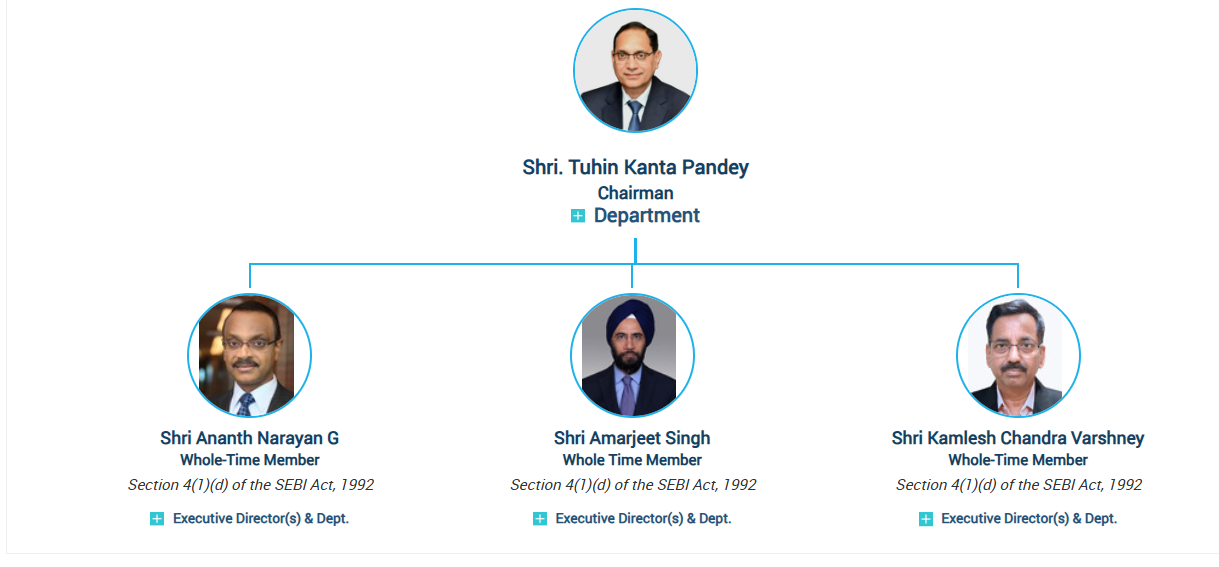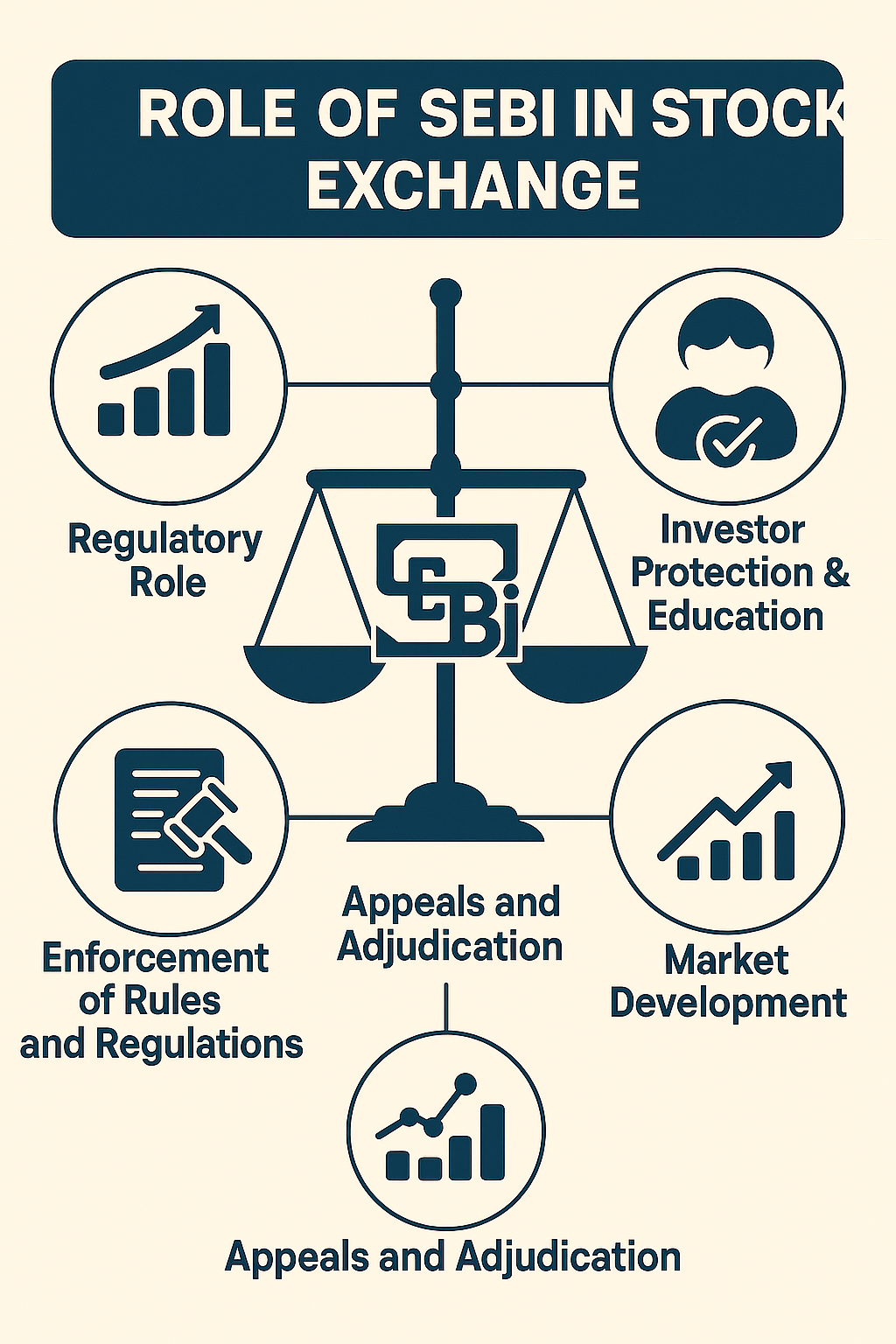Introduction
The Securities and Exchange Board of India (SEBI) is the apex regulatory body responsible for maintaining the integrity of the Indian stock market. SEBI performs several different functions with the aim of protecting the investor's interest and ensuring the smooth functioning of the stock market. But how exactly does SEBI do that? Read the article till the end to know.
Sneak peek into the past
- Before SEBI came into existence, the Indian stock market was completely unorganized and had no centralized authority governing the space. Making it highly vulnerable to frauds and scams.
- SEBI was established on April 12, 1988, as a non-statutory body for the purpose of regulating the securities market in India.
In 1992, the Government of India granted SEBI statutory status by passing the SEBI Act, 1992, in the parliament. This empowered SEBI to better regulate and prosper the stock market. - Over the years, SEBI has brought several reforms in the financial market to ensure it stays competitive with the global markets.
Organizational structure of SEBI
To have a better understanding of different roles and who carries out what function let's first understand the organizational structure of SEBI.

Image credit - https://www.sebi.gov.in/orgchart.html#
Board of directors
It is Apex decision-making authority. It consists of a chairman appointed by the Government of India and several other crucial members. It is mainly responsible for overall strategy and decision-making.
Management Team
Works on the direction of the board of directors and looks after the day-to-day functioning of various departments.
Other departments
Apart from this, there are regional office committees and advisory groups, support staff, and administrative units that help in the proper functioning of the organization.
Role of SEBI in Stock Exchange
SEBI performs several different functions to keep the Stock Exchange in the right shape. They are as follows

1. Regulatory role
One of the primary functions of SEBI is to regulate India's securities market and ensure it remains a fair, transparent, and efficient marketplace. As the regulator, SEBI oversees and governs various market participants, including stock exchanges, brokers, mutual funds, and listed companies.
2. Investor Protection and Education
Safeguarding the interests of investors in India's securities market is yet another key duty of SEBI. By implementing various measures, SEBI ensures that investors have access to accurate and timely information, enabling investors to make timely informed investment decisions. SEBI's initiatives include:
- Mandating disclosure of essential information by listed companies
- Regulating intermediaries to prevent fraudulent activities
- Establishing investor grievance redressal mechanisms
- Promoting investor education and awareness programs
- Enforcing strict penalties for market manipulation and fraud
- Conducting investors’ awareness program.
3. Enforcement of rules and regulation
SEBI has the power to enforce rules and regulations to ensure that the financial market stays fair and transparent. SEBI keeps a close eye on the market participants and holds them accountable for their actions and imposes penalties and sanctions on the offenders.
4. Market Development
SEBI acts as a catalyst for market development, by timely introducing initiatives that stimulate growth, strengthen the market, and increase investor participation.
5. Appeals and Adjudication
SEBI has the right to set up the Securities Appellate Tribunal (SAT) as an appellate authority to hear appeals against SEBI's orders and decisions. The Adjudication process is conducted by independent officers and ensures impartiality and consistency in decision-making. This demonstrates SEBI’s commitment to accountability, transparency, and maintaining the rule of law. It also helps refine regulatory practices and identify areas for improvement.
Thus, SEBI has become the backbone of the Indian economy. Within the past few years, India's economy saw robust growth which is still sustained. To ensure the Indian financial system always runs on a path of progress SEBI is constantly evolving and introducing innovations in the Indian market.
Planning your next move? Discover how to prepare your portfolio for uncertainties and opportunities of 2025 - Balancing Growth And Safety: How to Build A Resilient investment portfolio in 2025?
Frequently Asked Questions (FAQ)
What is full form of SEBI
The full form of SEBI is Securities and Exchange Board of India.
When was SEBI established? and why was it established?
SEBI was initially established in 1988 as a non-statutory body. However, it gained statutory powers in 1992 when the Government of India passed the SEBI Act, 1992 in the parliament. SEBI was established to protect investors and promote the development of the securities.
How to lodge a grievance complaint with SEBI?
There are multiple ways you can file a grievance complete with SEBI, dial the toll-free helpline number 1800 266 7575
Or email at -complaints@sebi.gov.in
Or download the SCORES app, available in the Play Store, and Apple Store
Or you can even send a letter to SEBI at the following address
Plot No. C4-A, 'G' Block, Bandra-Kurla Complex, Bandra (East), Mumbai - 400051, Maharashtra.
Are mutual funds regulated by SEBI?
Yes, mutual funds and other regulatory investment schemes in India are regulated by SEBI.
How do I check if my broker is registered with SEBI?
Every broker has a registration ID number, check the broker's website or documents for the registration number.
How does SEBI promote investor education and awareness?
SEBI organizes workshops, seminars, and conferences to educate investors about market dynamics and risks.
How does SEBI regulate foreign investments in India?
SEBI regulates foreign investments in India through the Foreign Portfolio Investment (FPI) Regulations and Foreign Direct Investment (FDI) Policy, setting guidelines for registration, investment limits, reporting, and compliance. SEBI also monitors foreign investments to prevent market manipulation and ensures compliance with Indian laws and regulations.
What is SEBI’s role in regulating credit rating agencies in India?
SEBI oversees and governs credit rating agencies in India, ensuring they maintain transparency, independence, and integrity in their rating processes so as to protect investors and maintain market trust.
How does SEBI promote corporate governance in India?
SEBI promotes corporate governance in India by setting standards and guidelines for listed companies, independent directors, and auditors, ensuring transparency through disclosure requirements. It also protects shareholder rights, regulates related-party transactions, and encourages corporate governance ratings.
Disclaimer: Investocraxze does not provide financial or investment advice. Content is for informational purposes only